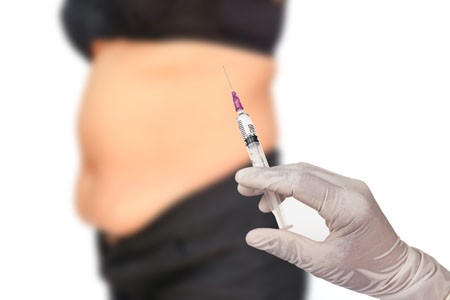Hyperinsulinemia Associated Depression
Haider Sarwar writes in Clinical Medicine Insights (2022) that “Hyperinsulinemia promotes fat accumulation, causing obesity. Being an inflammatory state, obesity can induce further inflammation and is a risk factor for HPA (hypothalamic pituitary axis) dysregulation through hypercortisolism-related hyperglycemia….A disruption on SNS (sympathetic nervous system) activity increases insulin levels, and induces glycogenolysis in the liver and lipolysis in adipose tissue during hypoglycemia. Hyperglycemia-hyperinsulinemia exacerbates inflammation and increases the oxidative stress along with regulating the levels of norepinephrine in the brain sympathetic system. Increased inflammatory cytokines have also been shown to disrupt neurotransmitter metabolism and synaptic plasticity which play a role in the development of depression via inhibiting serotonin, dopamine, melatonin, and glutamate signaling. An increased level of plasma insulin over time in the absence of exercising causes …an increase in insulin resistance due to obesity and further culminates into depression….. Triple therapy with SSRI, bupropion, and cognitive behavioral therapy aids in improving glycemic control, lowering fasting blood glucose, decreasing the chances of relapse, as well as decreasing cortisol levels to improve cognition and the underlying depression.”
Cold Water Immersion Can Have Benefits
From:
Medscape Staff, December 08, 2022
“Bathing in cold water or ice may cut “bad” body fat and reduce the risk of disorders such as diabetes, but other claims of health benefits are less defined, according to researchers from the Arctic University of Norway and the University Hospital of North Norway.
WHAT TO KNOW:
- Immersion in cold water has a major impact on the body. It elevates the heart rate and has positive effects on brown adipose tissue, a type of “good” body fat that is activated by cold and may protect against obesity and cardiovascular disease.
- Exposure to cold water or cold air also appears to increase the production of the protein adiponectin by adipose tissue. Adiponectin plays a key role in protecting against insulin resistance, diabetes, and other diseases.
- Repeated cold-water immersions by inexperienced as well as experienced swimmers during the winter months significantly increased insulin sensitivity and decreased insulin concentrations.
- Numerous health and well-being claims from regular exposure to the cold, such as weight loss, better mental health, and increased libido, may be explained by other factors, including an active lifestyle, trained stress handling, social interactions, as well as a positive mindset.
- Those seeking to voluntarily practice cold-water emersion need to be educated about possible health risks associated with taking a dip in icy water, which include the consequences of hypothermia, and of heart and lung problems, which are often related to the shock from the cold.”
Carnitine Reduced Body Weight and Insulin Resistance in Women with PCOS
Carnitine is an amino acid derivative sometimes used as a nutritional supplement. A 2016 study by Mansooreh Samimi and colleagues published in the journal Clinical Endocrinology found that carnitine supplementation reduced weight and insulin resistance in women with polycystic ovary syndrome (PCOS).
In the study, 60 overweight women with PCOS were randomized to receive either 250mg/day carnitine supplements or placebo. After 12 weeks, the carnitine group had lost an average of about 3 kg compared to the placebo group, and centimeters off their waist and hip measurements. Carnitine supplementation also lowered fasting blood glucose, insulin levels in blood, and insulin resistance compared to placebo.
Liraglutide FDA-Approved for Obesity
 The drug liraglutide (trade name Saxenda) has been approved by the Food and Drug Administration (FDA) as a treatment for obesity. It had previously been approved for the treatment of type 2 diabetes.
The drug liraglutide (trade name Saxenda) has been approved by the Food and Drug Administration (FDA) as a treatment for obesity. It had previously been approved for the treatment of type 2 diabetes.
Liraglutide is taken as a daily injection and is meant to be used alongside a calorie-reduced diet and increased physical activity. Liraglutide works by mimicking a peptide (GLP-1) that regulates appetite and calorie intake.
Recommended dosage is 3 mg/day, but should begin at 0.6 mg/day for the first week and gradually increase by 0.6mg each week to reduce the likelihood of gastrointestinal side effects.
In three clinical trials, participants who were overweight or obese, some of whom had weight-related conditions such as high blood pressure, type 2 diabetes, or high cholesterol, either received training about following a reduced-calorie diet and increasing physical activity or had already lost up to 5% of their body weight by engaging in these practices.
Among those participants who did not have diabetes or a weight-related condition, 62% lost up to 5% of their body weight after a year of taking liraglutide, compared to 34% of those who were given a placebo injection.
Of the participants who had type 2 diabetes, 49% lost up to 5% of their body weight after a year of liraglutide, compared to 16% of those who received placebo.
Of those who had a weight-related condition other than diabetes, 42% lost up to 5% of their body weight compared to 21.7% who took placebo.
New Injectable Treatment for Obesity
Liraglutide, an injectable drug used to treat Type 2 diabetes, has been approved by the Federal Drug Administration for the treatment of obesity. The drug is newly formulated in recommended doses of 3mg/day under the brand name Saxenda. Liraglutide is suggested for adults with a body mass of 30 or above, or 27 and above with other weight-related conditions such as hypertension, diabetes, or high cholesterol.
In clinical trials, out of 3,731 participants without weight-related comorbid conditions, 62% of those who received liraglutide lost at least 5% of their body weight, compared to 34% of those who received placebo. Of the 635 participants with Type 2 diabetes, 49% of those who received liraglutide lost at least 5% of their body weight, compared to 16% of those who received placebo. In the 422 participants with other weight-related comorbidities, 42% of those taking liraglutide lost 5% or more of their body weight compared to 21.7% of those on placebo.
There were also some improvements in risk factors for cardiovascular disease in people taking liraglutide.
Liraglutide affects appetite regulation, leading to reduced calorie intake that produces weight loss. The treatment is delivered in a pre-filled multidose pen that can be injected in the abdomen, thigh, or arm. Dosing begins at 0.6 mg/day to minimize unwanted gastrointestinal effects.
Loss of Appetite or Weight in Depressed Parents Predicts Depression in Children
 Depression in a parent is one of the factors that best predicts whether a young person will develop depression. Since depression symptoms can vary greatly from person to person and some symptoms are known to be more heritable than others, new research is investigating whether a parent’s profile of symptoms affects their child’s likelihood of developing the illness. A 2013 study by Mars et al. in the Journal of Clinical Psychiatry suggests that loss of appetite or weight in a parent with depression is the symptom that most strongly predicts new onset of depression and depressive symptoms in their offspring.
Depression in a parent is one of the factors that best predicts whether a young person will develop depression. Since depression symptoms can vary greatly from person to person and some symptoms are known to be more heritable than others, new research is investigating whether a parent’s profile of symptoms affects their child’s likelihood of developing the illness. A 2013 study by Mars et al. in the Journal of Clinical Psychiatry suggests that loss of appetite or weight in a parent with depression is the symptom that most strongly predicts new onset of depression and depressive symptoms in their offspring.
The study observed 337 parent-child pairs. The parents (mostly mothers), who had a history of recurrent unipolar depression, ranged in age from 25–55 years, and their children ranged from 9–17 years. The study lasted four years, during which the families participated in three assessments. Parents’ symptoms were recorded and children were also assessed for symptoms or new development of depression. Thirty percent of the offspring whose parents reported weight loss or low appetite were found to have new onset of depression at followup, compared to nine percent of the offspring whose parents did not have these symptoms.
There are nine symptoms used to diagnose depression in the Diagnostic and Statistical Manual for Mental Disorders: low mood, loss of interest (anhedonia), loss of energy, change in appetite or weight, change in sleep, low self-esteem or guilt, suicidality, psychomotor slowing (retardation), and loss of concentration or indecisiveness. Of these, parental loss of appetite or weight was the only symptom that predicted depression in a child. Interestingly, the severity of parental depression or the presence of other health problems in the parent did not account for the emergence of illness in the children.
Good Weight Loss With Bupropion Plus Naltrexone
 A 2013 article by Smith et al. in the journal Diabetes, Obesity, and Metabolism reports that obese patients treated with the combination of bupropion (Wellbutrin) and naltrexone (Revia) had excellent weight loss and reduction in body fat compared to those treated with either drug alone or with placebo. The combination resulted in about a 14% reduction in body fat, while placebo, bupropion alone, and naltrexone alone each brought about only a 3-4% reduction.
A 2013 article by Smith et al. in the journal Diabetes, Obesity, and Metabolism reports that obese patients treated with the combination of bupropion (Wellbutrin) and naltrexone (Revia) had excellent weight loss and reduction in body fat compared to those treated with either drug alone or with placebo. The combination resulted in about a 14% reduction in body fat, while placebo, bupropion alone, and naltrexone alone each brought about only a 3-4% reduction.
Editor’s Note: Researcher Roger McIntyre is an expert on the metabolic syndrome in patients with bipolar illness and has been using this combination with success in patients with mood disorders. He finds the combination of bupropion and naltrexone more helpful than the anticonvulsants topiramate (Topomax) or zonisamide (Zonegran) or the anti-diabetes drug metformin.
Since obesity and the metabolic syndrome occur in approximately 40 to 50% of bipolar patients and significantly increases cardiovascular risks such as heart attack and stroke, and since bupropion is widely used in the treatment of bipolar depression, this combination appears worthy of consideration for those with obesity. Its use should be accompanied by a good diet and an exercise regimen. Decreasing cardiovascular risk is a very important component of the treatment of bipolar disorder, and the combination of bupropion and naltrexone could have substantial benefits.
Ziprasidone Improves Mood With Possible Weight Loss Side Effects
 In an open study of bipolar disorder treatment, Shefali Srivastava, Terence Ketter and colleagues at Stanford University evaluated ziprasidone as an aid to patients unresponsive to other medications. This study was part of the multi-center research program Systematic Treatment and Evaluation Program for Bipolar Disorder, or STEP-BD. During naturalistic treatment, ziprasidone was added to an average of 3.6 other psychotropic medications and 1.2 other nonpsychotropic medications patients had already been prescribed. The researchers found substantial improvement in mood with ziprasidone, particularly in the patients who had symptomatic levels of depression at baseline. The research team also observed a mean weight decrease from 195 + 50lbs at baseline to 183 + 47lbs at the final visit, with 34.3% of the patients achieving at least a 7% weight loss with ziprasidone.
In an open study of bipolar disorder treatment, Shefali Srivastava, Terence Ketter and colleagues at Stanford University evaluated ziprasidone as an aid to patients unresponsive to other medications. This study was part of the multi-center research program Systematic Treatment and Evaluation Program for Bipolar Disorder, or STEP-BD. During naturalistic treatment, ziprasidone was added to an average of 3.6 other psychotropic medications and 1.2 other nonpsychotropic medications patients had already been prescribed. The researchers found substantial improvement in mood with ziprasidone, particularly in the patients who had symptomatic levels of depression at baseline. The research team also observed a mean weight decrease from 195 + 50lbs at baseline to 183 + 47lbs at the final visit, with 34.3% of the patients achieving at least a 7% weight loss with ziprasidone.
Mean trial duration was 860 + 700 days, with no subsequent psychotropic agents added in 51.2% of the patients who had a mean trial duration of 221 + 272 days. Ziprasidone was discontinued in 57.3% of the 82 trials after a mean of 208 + 364 days. This was due to side effects in 26.8% of the participants and due to inefficacy for mood in 23.2%.
The investigators concluded that in bipolar patients treated naturalistically with complex pharmacotherapy, ziprasidone decreased overall bipolar illness severity, was helpful in patients with substantial depression at baseline, and also yielded clinically significant weight loss in about one-third of the patients.
Editor’s note: These data are notable because they support ziprasidone’s pattern of weight neutrality and because of the overall improvement in mood symptomatology the drug brought about. Read more



